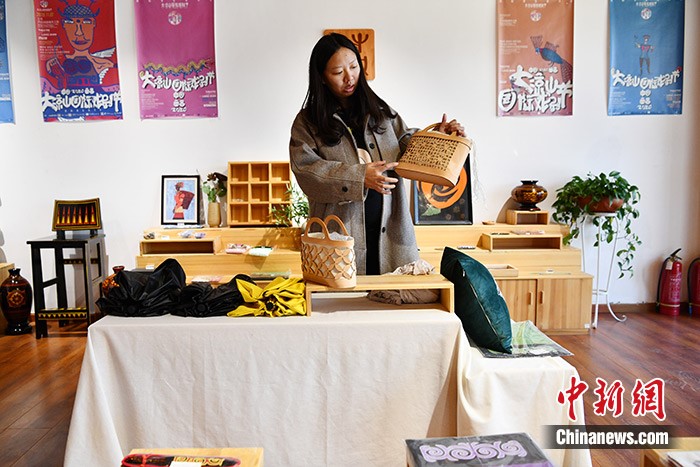


Yang Ding, a post-90s PhD graduate of the Yi ethnic group from Liangshan Yi Autonomous Prefecture, showcases a product she designed. Founder of a woodware brand, Yang is committed to passing on and innovating traditional Yi culture. Photo/Chinanews.com
Yang Ding, a PhD graduate who is an ethnic Yi from Liangshan Yi Autonomous Prefecture in southwest China’s Sichuan province, combines artistic elements of traditional Yi culture with her woodware products, bringing the beauty of Yi culture to more people.
The products made by Yang’s company are sold not only in Sichuan province, but also in overseas markets such as the U.S. and Canada. Last year, her company’s total output of woodware products exceeded 3 million yuan (about $463,800). Yang told the media that her company is negotiating business partnerships with companies from the UK and Italy.
Yang, whose major is furniture design, came up with the idea of showcasing her ethnic culture in woodware products because she believes that traditional Yi culture is crucial to the sustainable development of her hometown, which is also China's largest Yi community. She was saddened to see that with the acceleration of urbanization, the local cultures of many places across the country has gradually became extinct, and believes that the Yi culture will be the cornerstone for the region’s sustainable development, and particularly for rural rejuvenation in the future.
Before she started her business, Yang spent three years with her team collecting traditional Yi architectural patterns in 230 households scattered around 17 counties and cities in Liangshan Yi Autonomous Prefecture.
In addition, the woodware business also helped more than 300 people find jobs in related areas such as woodware making, lacquer painting, Yi embroidery, and felting weaving. “I find starting my own business quite worthwhile, as I have helped more people live better lives while passing on Yi culture,” she said.
As for the biggest reward that comes from starting up a business, the post-90s woman said it is the friends she has made along the way. “A growing number of young people are returning to our hometown, bringing technologies and concepts for passing on our intangible cultural heritage,” she explained.
 Fire brigade in Shanghai holds group wedding
Fire brigade in Shanghai holds group wedding Tourists enjoy ice sculptures in Datan Town, north China
Tourists enjoy ice sculptures in Datan Town, north China Sunset scenery of Dayan Pagoda in Xi'an
Sunset scenery of Dayan Pagoda in Xi'an Tourists have fun at scenic spot in Nanlong Town, NW China
Tourists have fun at scenic spot in Nanlong Town, NW China Harbin attracts tourists by making best use of ice in winter
Harbin attracts tourists by making best use of ice in winter In pics: FIS Alpine Ski Women's World Cup Slalom
In pics: FIS Alpine Ski Women's World Cup Slalom Black-necked cranes rest at reservoir in Lhunzhub County, Lhasa
Black-necked cranes rest at reservoir in Lhunzhub County, Lhasa China's FAST telescope will be available to foreign scientists in April
China's FAST telescope will be available to foreign scientists in April "She power" plays indispensable role in poverty alleviation
"She power" plays indispensable role in poverty alleviation Top 10 world news events of People's Daily in 2020
Top 10 world news events of People's Daily in 2020 Top 10 China news events of People's Daily in 2020
Top 10 China news events of People's Daily in 2020 Top 10 media buzzwords of 2020
Top 10 media buzzwords of 2020 Year-ender:10 major tourism stories of 2020
Year-ender:10 major tourism stories of 2020 No interference in Venezuelan issues
No interference in Venezuelan issues
 Biz prepares for trade spat
Biz prepares for trade spat
 Broadcasting Continent
Broadcasting Continent Australia wins Chinese CEOs as US loses
Australia wins Chinese CEOs as US loses